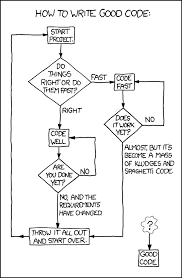In the ever-evolving landscape of technology, the ability to write efficient, maintainable, and scalable code is a skill that every developer aspires to master. Writing better code is not just about getting the job done; it’s about creating a robust foundation for future development and fostering collaboration within a team. In this article, we’ll explore some key principles and practices that can elevate your code to the next level.

- Understand the Problem Before Writing Code:
One of the common pitfalls in coding is diving straight into the code without a clear understanding of the problem at hand. Before you start typing, take the time to thoroughly comprehend the requirements. Sketch out a plan or algorithm on paper if needed. A solid understanding of the problem will lead to more efficient and effective code.
- Keep It Simple, Stupid (KISS):
Simplicity is a virtue in coding. Strive for simplicity in your code, favoring clarity over complexity. A simple, straightforward solution is often easier to understand, maintain, and debug. Avoid unnecessary abstractions and clever tricks unless they significantly improve readability and maintainability.
- Code Readability Matters:
Code is read more often than it’s written. Write code with the assumption that someone else (or even future you) will need to understand and modify it. Use meaningful variable and function names, follow a consistent coding style, and add comments where necessary. Tools like linters can help enforce coding standards.
- Modularize Your Code:
Break your code into small, manageable modules or functions. Each module should have a single responsibility, making it easier to understand and test. This modular approach enhances code reusability and maintainability. It also facilitates collaboration within a team, as different team members can work on different modules concurrently.
- Test-Driven Development (TDD):
Adopting Test-Driven Development is a powerful way to ensure code quality. Write tests for your code before writing the actual implementation. This not only helps catch bugs early but also guides your design decisions. As a result, you end up with code that is not only functional but also reliable.
- Version Control:
Utilize version control systems like Git to track changes in your codebase. Version control not only provides a safety net in case something goes wrong but also enables collaboration and code review. It’s an essential tool for maintaining a clean and organized codebase.
- Continuous Integration and Continuous Deployment (CI/CD):
Implement CI/CD pipelines to automate the testing and deployment process. This ensures that your code is always in a deployable state. Automated testing and deployment reduce the chances of introducing bugs into production and streamline the development workflow.
- Learn from Others:
Engage with the developer community, read code written by experienced developers, and participate in code reviews. Learning from others’ experiences and mistakes is a valuable way to improve your coding skills. Embrace feedback and be open to new ideas and perspectives.

Conclusion:
Writing better code is a journey, not a destination. By embracing these principles and practices, you can elevate your coding skills and contribute to the creation of maintainable, efficient, and scalable software. Remember, the goal is not just to write code that works, but to write code that stands the test of time. Happy coding!


